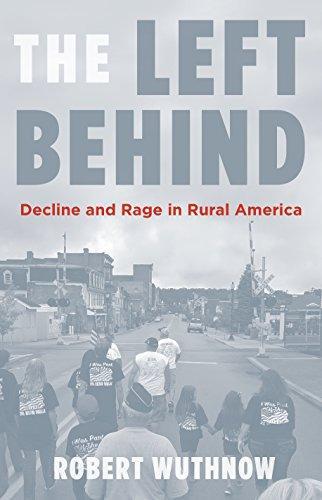Review of 'The Left Behind : Decline and Rage in Rural America' on 'Goodreads'
4 stars
The book contains a great description of the concerns of rural people in a variety of communities as the describe them, as well as the interesting and valuable concept of the "moral order," which essentially seems to be a set of norms about how things should be done and how people ought to behave. When those norms are violated or come under pressure from the outside, the community reacts angrily and considers itself under siege by people who have no "common sense", as demonstrated by their lack of adherence to these norms. They would prefer to handle everything their way, according to the norms inherent in their conception of how the world should work. Yet the rural communities are dependent on global markets and funding from Washington. This is especially galling because part of the "moral order" is that you're supposed to be totally self sufficient, unless you're recovering from …
The book contains a great description of the concerns of rural people in a variety of communities as the describe them, as well as the interesting and valuable concept of the "moral order," which essentially seems to be a set of norms about how things should be done and how people ought to behave. When those norms are violated or come under pressure from the outside, the community reacts angrily and considers itself under siege by people who have no "common sense", as demonstrated by their lack of adherence to these norms. They would prefer to handle everything their way, according to the norms inherent in their conception of how the world should work. Yet the rural communities are dependent on global markets and funding from Washington. This is especially galling because part of the "moral order" is that you're supposed to be totally self sufficient, unless you're recovering from some kind of short term setback such as illness or a bad harvest, etc. This coupled with people seemingly "rejecting" the community by moving out en masse, businesses shutting down, etc. leads to the perception that their community is under siege by hostile and culturally alien forces.
This part of the book is good, but I sometimes wish the analysis was deeper. The author brings up a number of racially charged statements made in small towns in the final chapter but seems to dismiss them as being important motivating factors in politics, on the basis of citing a single NYT article. It seemed a little thin to me, especially because of numerous places in the text where he alluded to the potency of barely submerged racial animosity as a motivating factor for people, e.g. passages where he described hatred of the government in a community going back to anger at northern carpetbaggers at the end of reconstruction and how older people in the community remember voting for Goldwater in opposition to the civil rights movement. Given that this seems implicitly to be a book about explaining rural Trump voters to city people who don't understand them, I think that this topic should have been explored more fully. I feel that the author's deep sympathy for small communities and his origin within one makes him reluctant to call out the negative aspects of this kind of community, and when he does he always seems eager to shift back onto more positive ground as quickly as he can. I still think it's a valuable book in that the positives of rural communities in America are often neglected, and the people in these communities experience real difficulty with the government that should not be ignored. Even as someone who is very progressive leaning and a "big government liberal," I felt sympathetic to the town officials describing the impact of unfunded federal mandates on their small town budgets, and how they were forced to cut money from core services such as police and park service in order to meet them. But I don't know that I understand or sympathize so much with the proferred "moral order" that seems to implicitly include the disapproval and/or oppression of gay people, black people, Muslims, and a host of other minority groups in addition to the more positive elements of promoting politeness and compromise within the in-group.

